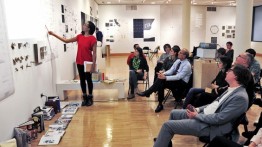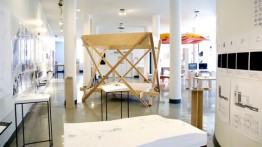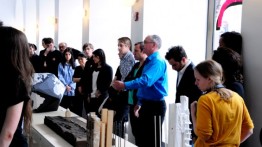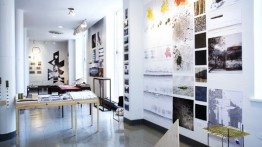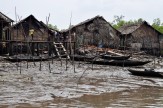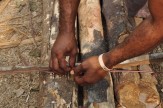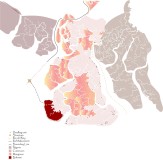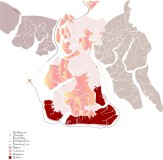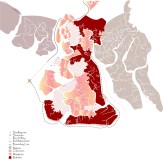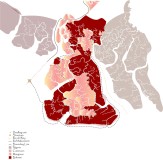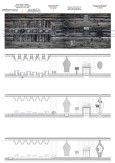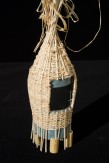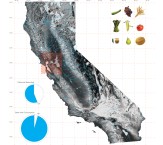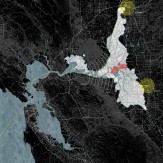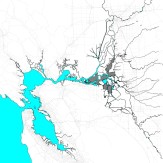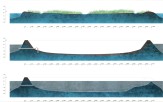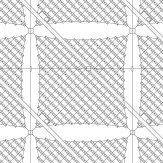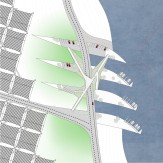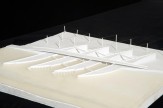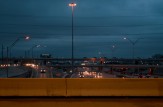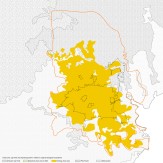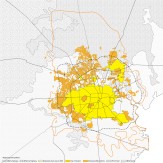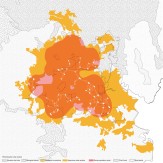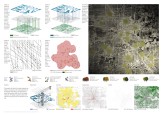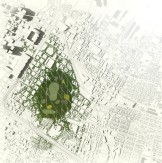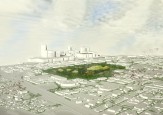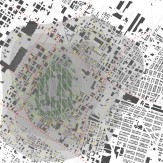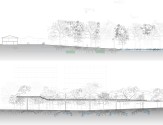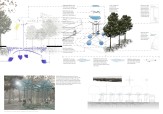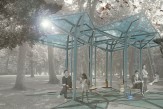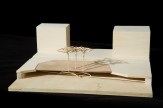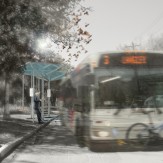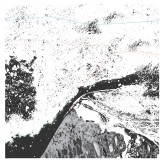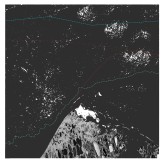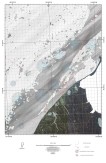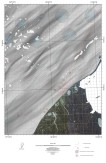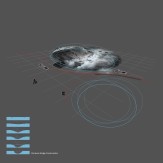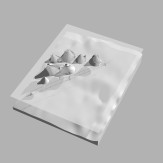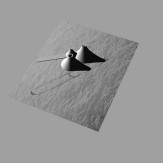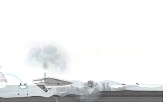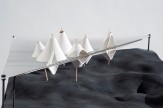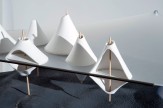Selected Undergraduate Design Studio Projects--Thesis 2012-13
THESIS
Professors David Turnbull, Hayley Eber & Urtzi Grau
We are proud of our students, their fortitude, their determination, and their desire for creative freedom.
The Cooper Union has never been a place where ‘anything goes’, but it has always been a special place, a secure place where creative freedom is supported, encouraged, stimulated, and where speculative thought and imagination has been directed inward, within the discipline of Architecture, and outward, to the World, simultaneously. The Thesis year allows our students to be strong, but also, to be secure. We insist that real speculative thought, and inventive design can only take place in surroundings that are protective. The School of Architecture used to be described as a sanctuary. In the World, such places are now rare, precious and more necessary than ever. But, it is apparent that the desire for sanctuary can no longer be understood as a symptom of the desire to escape from the world. Rather, the sanctuary has to be conceived as a protected place that provides a protected vantage point, from which a thorough engagement with contemporary realities can be conducted. In this place the studio is both mirror and lens, the work of the studio is both reflexive and projective.
Projects
-
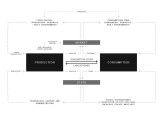
The Manhattan Project
-
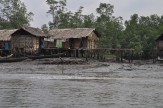
Reconstructing the Banal: A Venture Into the Disputed Bakassi Peninsula
-

The Reemergence of a Dynamic Landscape: A New Delta Ecology
-

Urban Forest: Houston, Texas
-
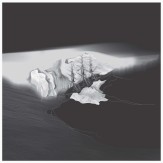
A Tactical Vision for the Arctic: Barrow, Alaska [71.3003° N, 156.7358° W]
Back
The Manhattan Project
-

Capital Flow Diagram
-

Map of Manhattan Project Site - US
-
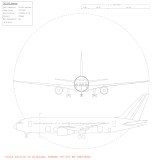
Plane Section - Boeing 747
-
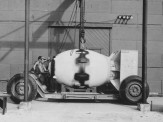
Fat Man on Tinian
-

Bomb Section - Fat Man
-
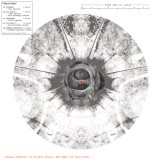
Bomb Plan - Explosion Radius
-
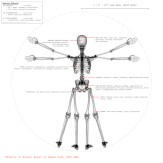
-

Manhattan Project Site - Japan
-
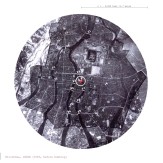
Hiroshima - Before
-
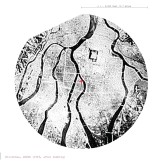
Hiroshima - After
-
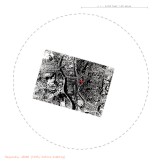
Nagasaki - Before
-
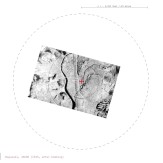
Nagasaki - After
-
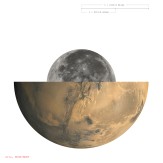
Planetary Section
-

Geopolitical Dymaxion
-
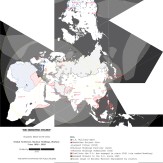
Geopolitical Dymaxion - Detail
-
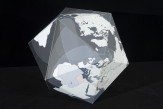
-
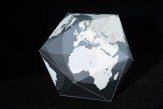
-

Zulaikha Ayub
The Manhattan Project is an investigation into the international geopolitical environment of the United States military arm, which has increasingly dominated the world stage in the last century. This study focuses on the creation and deployment of the Atomic Bomb during World War II, a “moment when man first turned on himself the elemental forces of his own universe” (No High Ground,1960), and a defining nexus in the history of human civilization. This thesis attempts to demonstrate the enormous capacity of the natural and physical science disciplines when appropriated by concentrated military power in the form of an alternative archive that contains images, official documents, fabrication diagrams, geographical sites and weaponry that narrate this history from 1939 and into the Cold War. In addition to exposing the empirical processes that led to the bomb’s development, the archive envisions a history of a future that captures man’s altered disposition to his environment in the post- atomic world in the form of a ‘black box’ that represents the associated conditions of disparate scales, invisible systems and pre-figured knowledge.
Reconstructing the Banal: A Venture Into the Disputed Bakassi Peninsula
Eze Imade Eribo
The Bakassi Peninsula, a 665 square kilometer piece of land surrounded by water and situated on the border between Nigeria and Cameroon, has been the epicenter of conflict between the two countries resulting in shifting conflicts of identity, displacement, maltreatment and death of the Bakassi natives. All the while the subdued plights of the people remain hidden. How then do you speak of political oppression when you’re not even allowed to speak of politics?
The engagement of an inherent medium of self expression; storytelling, became the overlay for telling these tales of conflicts. The other facilitators lay in tools indigenous to the area – the bamboo raft; the medium of transportation, and the radio; the medium of news dissemination. The reuse and redesign of these tools, local techniques and materials became a mechanism for a structure that creates spaces of engagement and discourse. The bamboo raft itself became the site of a fish smoke house, a water filtration site, and through the medium of subterfuge, also housed a secret radio station. People will travel on the raft to each settlement and collect factual stories of conflict rewritten into myths and tales on cassettes played through a cassette player that becomes the main audio source for radio transmission. By using objects and resources that reside in the mundane, it is the exposition of the potentials of problem solving as local, communal and sustainable possibilities. Architecture in this regards becomes the panacea to shattered identities, communal restructuring and the harnessing and appreciation of culture and the human condition, both socially and economically. It serves as the thread for the cohesive restoration of the self.
The Reemergence of a Dynamic Landscape: A New Delta Ecology
Jeremy Jacinth
This proposal is an effort to rethink the inhabitation of a landscape in crisis. Beginning in the 1850’s Sacramento’s San Joaquin Delta was converted from fresh water tidal marshland into a series of islands constructed with levees around the perimeter, and drained in order to “reclaim” land for agricultural production. Due to various factors, this reclaimed farmland began to compact, contributing to the current condition wherein the levees contain the sunken islands, which are now more than twenty feet lower than their natural height. This project proposes a return to the dynamic condition of the original landscape by systematically reimagining agricultural production, allowing for the inundation of the islands as needed. In doing so, the risk of levee failure and resulting property damage can be mitigated. By concentrating the inhabitation and commerce of these islands at the proposed infrastructural elements, the region can streamline the circulation of goods while also creating valuable public space that will serve as a place of recreation.
Urban Forest: Houston, Texas
Teddy Kofman
In this project I propose to reorganize the urban form of Houston, Texas through the restoration of the prairie and the creation of a continuous urban forest. These two ecosystems will be integrated within the urban fabric and used as an environmental, social, and architectural tool to create new spaces in the city and improve existing ones, both private and public. With the future expansion of urban centers around the world, my project hypothesis is that a new equilibrium between nature and human habitation must be achieved in order to adapt to a changing climate, environment, and society.
The design proposal consists of two strategies; a network of biological islands, and a modular transit station. I view the urban region as an opaque surface of concrete, which I propose to perforate with islands of urban forest and grass land. These archipelagos, which will connect through the existing fabric of the city, will integrate the biological ecosystems with the urban one. The transit station supports four trees in surviving the dry season in Houston. This is intended to create a continuous canopy of urban and wild elements – in the form of transportation hubs and urban forests - a network that induces both passenger and biological movement and exchange.
A Tactical Vision for the Arctic: Barrow, Alaska [71.3003° N, 156.7358° W]
David Varon
Accelerated environmental conditions in the Arctic have begun to cause warming oceans and iceless summers. Ice, which once protected Alaska’s coast, has disappeared. Erosion is chewing away at Barrow’s borders at about thirty to forty-five feet per year, encroaching on the coastal town and greatly affecting the surrounding natural habitats. The iceless ocean has also allowed for a growing shipping traffic and an increased danger of oil spills.
This proposal explores the creation of ‘tactical’ nodes off the Northern coastline of Alaska, between Point Barrow and Prudhoe Bay. Through the use of proposed off shore research stations, pontoon bridges and the use of pumps to spray sea water to create ice island habitats and whiten clouds in order to increase their reflectivity, the results of atmospheric warming prevalent in the Arctic might be halted.

